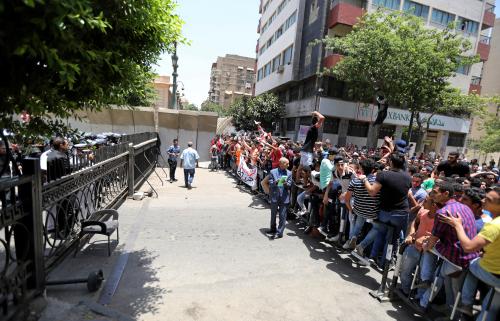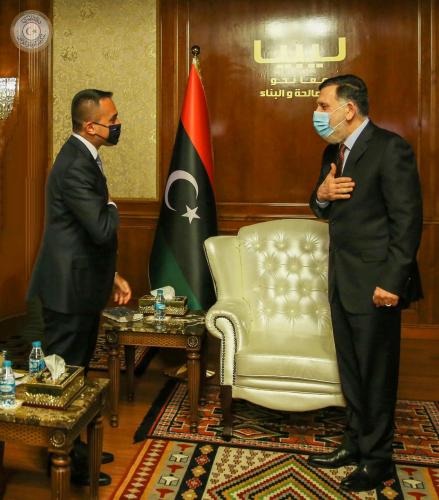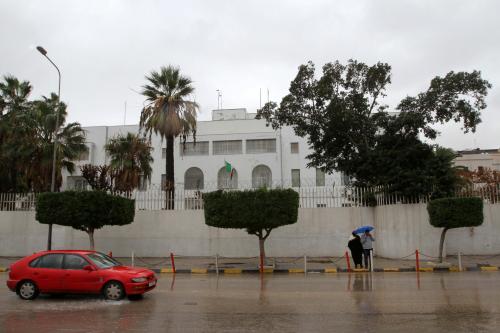Recent developments in Libya make it hard to be optimistic about the survival of the country as a unified and stable state. The smuggling of migrants—comparable in some ways to the slave trade of the 17th and 18th centuries—has skyrocketed, setting off worrisome alarms throughout the Mediterranean region. This is compounded by the situation in Libya itself, which appears to exist in a permanent state of anarchy characterized by fighting between militias, gangs, and tribes. The recent clashes around the oil terminals in the Gulf of Sidra are just an example of this state of instability and lawlessness.
What Libya is missing today is strong and determined leadership, empowered by a wide democratic mandate and with an inclusive policy program that could tackle the rapid deterioration of the country. There has been considerable speculation over whether Western countries will stop supporting the U.N.-backed Presidential Council (PC) in Tripoli and switch their allegiance to the eastern strongman General Khalifa Haftar. Some are of the opinion that Haftar would be the right person to keep the country united and guarantee a modicum of stability—hence allowing the migration and terrorism challenges to be addressed.
But this would be the wrong choice. No one in Libya today has the strength to reach a military victory or rule the whole country, and the fight alone would cause permanent damage to Libya’s social fabric, threatening a continuation of guerrilla warfare and terrorism. There is no alternative to a negotiated solution. The challenge is reaching a sustainable one.
Italy: A good apple among many bad
Libya has increasingly become a proxy war among foreign actors. A united international front is therefore essential to the success of Libyan negotiations over the country’s future. But international actions have recently tended to generate more negative reactions than positive ones.
Take Italy. Italy has supported the U.N.-led negotiations and the resulting Presidential Council (PC) from the start. But some in Libya have labeled its support neo-colonialism. In January, Italy became the first Western country to announce the reopening of its embassy in Tripoli, a risky move that, nevertheless, sent a strong signal of support for the government of PC president Fayez Serraj. In an earlier sign of goodwill in 2016, Italy sent a mission to Misrata to install a field hospital to treat wounded soldiers fighting the self-proclaimed Islamic State (ISIS) in Sirte. Considering the insufficiency of the medical infrastructure in Libya, this was an important gesture.
However, some Libyan actors have criticized Italy’s involvement. The Italian government offered to install a field hospital for Haftar’s Libyan National Army, but this offer was brusquely rejected. Khalifa Gwell, the head of the so-called Government of National Salvation, an illegitimate institution that allegedly governed the Western part of the country from 2014 to 2016, abruptly told the Italian Prime Minister Paolo Gentiloni in January to “withdraw his troops” from Misrata because of Italy’s “colonial history of fascism.” At the same time, the prime minister of Tobruk-based House of Representatives (HoR) Abdullah al-Thinni issued an urgent diplomatic note to all foreign embassies and consular offices informing them that “an Italian military vessel loaded with soldiers and ammunitions has entered the Libyan territorial waters,” adding: “This is a clear violation of the U.N. Charter and a form of repeated aggression.” All of this happened as the Russian air carrier Admiral Kuznetzov sat anchored at the coast of Cyrenaica, hosting Field Marshal Haftar himself, who reportedly signed unknown deals on behalf of the Tobruk government. The hypocrisy is self-evident.
There is no doubt that Italy has committed grave mistakes in the past, as well as more recently. However, it is also true that Rome’s conduct towards post-2011 Libya has been one of the most coherent and transparent, not only in words but in deeds. This is evident in the behavior of Italian ambassador to Tripoli Giuseppe Perrone. In early February, Perrone traveled to Tobruk to meet HoR president Agila Saleh and other members of the parliament to seek a political compromise. Following the Benghazi Defense Brigade’s (BDB) contentious temporary occupation of the oil terminals in March, the Italian government endorsed the BDB’s relinquishing of the terminals to the National Oil Corporation in Tripoli that permitted the PC/Government of National Accord to continue to enjoy oil sale revenues in the Gulf of Sidra. While the wisdom of the approach itself could be debated, it was definitely a coherent one—and one that could hardly be called neo-colonialist.
Italy has been trying to keep Libya at the center of international attention, and has delivered significant humanitarian aid to the needy country by hosting hundreds of wounded Libyan fighters in its hospitals. Italy wants Libya to achieve stability and peace because, unlike many other international actors involved in the Libyan theater, it recognizes the importance of a stable and peaceful Libya capable of governing its territory. Italy has no “colonial project,” nor any intention to establish a protectorate or extend its influence over Libyan coasts. Italy simply recognizes that the destiny of these two countries are once again interconnected by a series of international interventions in Libya that—this time—are all but Italian.
Work together
For the last six years, various players have intervened in Libya without a common project—only with their particular targets to pursue. That has completely spoiled the process of natural selection at the political level, not favoring the most deserving leader, but the most supported in terms of means and weapons. And the effects have been devastating, facilitating the fragmentation of Libyan society. All the international actors involved in Libya must ask themselves: Where are we heading in Libya? If stability and security for Libya are really the goals, then there is no alternative for the international actors but to honestly and consistently support the U.N.-led negotiation and the Libyan Political Agreement, with all the pertaining corrections and amendments needed to improve its functionality and efficacy.








Commentary
No, Italy is not guilty of neocolonialism in Libya
April 3, 2017